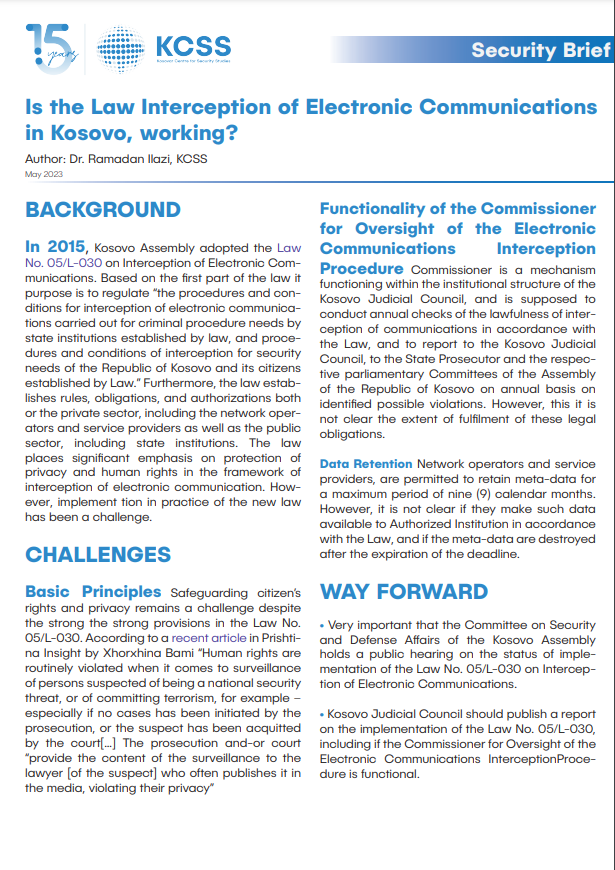19/05/2023

Kosovar Centre for Security Studies
Qendra Kosovare për Studime të Sigurisë
Ramadan Ilazi
Background
Against the background of increasing concerns among the public of potential abuses with the interception of telecommunication and violation of citizens’ rights and privacy, in 2015, Kosovo Assembly adopted the Law No. 05/L-030 on Interception of Electronic Communications. Base on the first part of the law it purpose is to regulate “the procedures and conditions for interception of electronic communications carried out for criminal procedure needs by state institutions established by law, and procedures and conditions of interception for security needs of the Republic of Kosovo and its citizens established by Law.” Furthermore, the law establishes rules, obligations, and authorizations both for the private sector, including the network operators and service providers as well as the public sector, including state institutions. The law places significant emphasis on protection of privacy and human rights in the framework of interception of electronic communication. However, implementation in practice of the new law has been a challenge.
Challenges
· Basic Principles, safeguarding citizen’s rights and privacy remains a challenge despite the strong the strong provisions in the Law No. 05/L-030. According to a recent article in Prishtina Insight by Xhorxhina Bami “Human rights are routinely violated when it comes to surveillance of persons suspected of being a national security threat, or of committing terrorism, for example – especially if no cases has been initiated by the prosecution, or the suspect has been acquitted by the court[…] The prosecution and-or court “provide the content of the surveillance to the lawyer [of the suspect] who often publishes it in the media, violating their privacy”.
· Functionality of the Commissioner for Oversight of the Electronic Communications Interception Procedure. Commissioner is a mechanism functioning within the institutional structure of the Kosovo Judicial Council, and is supposed to conduct annual checks of the lawfulness of interception of communications in accordance with the Law, and to report to the Kosovo Judicial Council, to the State Prosecutor and the respective parliamentary Committees of the Assembly of the Republic of Kosovo on annual basis on identified possible violations. However, this it is not clear the extent of fulfilment of these legal obligations.
· Data Retention, network operators and service providers, are permitted to retain meta-data for a maximum period of nine (9) calendar months. However, it is not clear if they make such data available to Authorized Institution in accordance with the Law, and if the meta-data are destroyed after the expiration of the deadline.
Way forward
· Very important that the Committee on Security and Defense Affairs of the Kosovo Assembly holds a public hearing on the status of implementation of the Law No. 05/L -030 on Interception of Electronic Communications;
· Kosovo Judicial Council should publish a report on the implementation of the Law No. 05/L -030, including if the Commissioner for Oversight of the Electronic Communications Interception Procedure is functional.